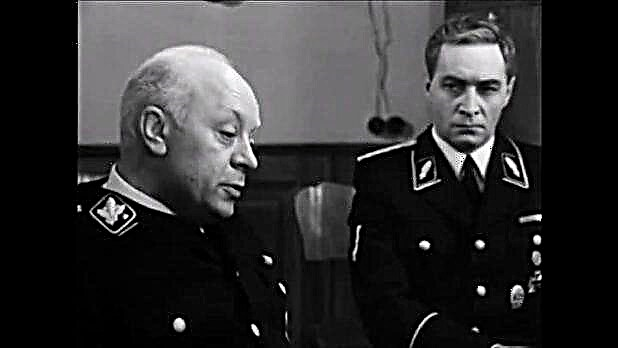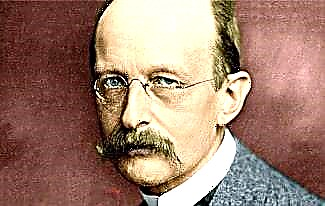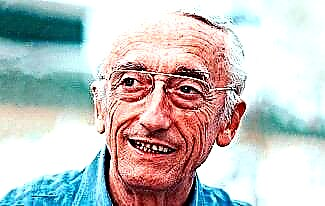Soviet cinema was a whole world in itself. The huge industry every year produced hundreds of various films, attracting hundreds of millions of viewers. It is impossible to compare the then attendance of cinemas with the current one. A modern popular film, whether it be a superblockbuster three times, is an event only and exclusively in the world of cinema. A successful Soviet film became a nationwide event. In 1973, the film “Ivan Vasilyevich Changes His Profession” was released, which was watched by 60 million people in a year. In the same year, an epoch-making event took place - the Yenisei was blocked by a dam. The question of what event remained in the memory of the people does not require an answer ...

In the world of cinema, extraordinary personalities gather, capable of stirring up the interest of the viewer. This originality, of course, is not limited to the framework of the film set. Moreover, often it is outside the frame of the frame that passions are much more stormy than written in the script. If they really love it, then so that he left with a toothbrush from one, left this brush with another and went to spend the night at a hotel by the third. If they drink, then almost literally to death. If they swear, it is so that a film cannot be released, on which dozens of people have worked for a year. Hundreds of volumes of memoirs have been written about this, in which sometimes you can find real zest.
1. Stories that this or that actor got into the profession by chance are not uncommon. But it's one thing when chance helps a person achieve popularity and fame, and quite another when chance works against him. At the dawn of the acting career of Margarita Terekhova, both of them were enough. Having dropped the physics and mathematics department of the Central Asian University, the girl came to Moscow and almost entered VGIK on the fly. Almost - because after the interview she was still not taken to the forge of cinematic shots. Margarita, who had already received a place in the hostel, was getting ready to go home to Tashkent. However, someone stole money set aside for a return ticket from her nightstand. Compassionate students offered her to work part-time in a documentary film extras. There Terekhova accidentally heard that the director Yuri Zavadsky (he headed the Mossovet Theater) was recruiting young people to his studio. Such sets were very rare, and Terekhova decided to try. At the interview, she first stunned everyone with Natalia's monologue from the novel “Quiet Flows the Don”, after which Zavadsky asked to perform something quieter. The performance was, apparently, really impressive, for Vera Maretskaya woke up, and Valentina Talyzina decided that Terekhova was either genius or abnormal. Margarita quietly read the poems of Mikhail Koltsov, and she was accepted into the studio.

2. Actor Pavel Kadochnikov, after filming the film "The Exploit of the Scout", has a unique paper, which would now be called an "all-terrain pass" JV Stalin liked the film and Kadochnikov's play so much that he called the image of Kadochnikov a real Chekist. The leader asked the actor what pleasant he could do in gratitude for such a game. Kadochnikov jokingly asked to write the words about the real Chekist on paper. Stalin chuckled and did not answer, but a few days later Kadochnikov was handed a paper on a Kremlin letterhead signed by Stalin and KE Voroshilov. According to this document, Kadochnikov was awarded the rank of honorary major of all branches of the Soviet Army. To the actor's credit, he used this document only in the most extreme cases. For example, when in June 1977 in Kalinin (now Tver) some episodes of the film "Siberiade" were re-filmed, Kadochnikov, Natalya Andreichenko and Alexander Pankratov-Cherny staged naked bathing with loud songs in the city center, policemen pulled them out of the water. The scandal could have turned out to be unheard of, but Kadochnikov presented the saving document on time.

Pavel Kadochnikov 30 years before the incident with nudist bathing in Kalinin
3. In 1960, the first episode of Mikhail Schweitzer's film "Resurrection" was released on the screens of the Soviet Union. The main role in it was played by Tamara Semina, who during the filming was not even 22 years old. Both the film and the leading actress had a resounding success not only in the USSR. Semina received awards for best actress at festivals in Locarno, Switzerland and Mar del Plata, Argentina. In Argentina, the picture was presented by Semina herself. She was amazed at the attention of the temperamental South Americans, who literally carried her in their arms. In 1962, the second series of the film was presented, which was also very popular. This time Semina could not go to Argentina - she was busy filming. Vasily Livanov, a member of the delegation, recalled that the film crew of "Resurrection" was forced to constantly answer questions about what exactly Semina did not like in Argentina so much that she did not come along with other actors.

Tamara Semina in the film "Resurrection"
4. The role of Stirlitz in the series “Seventeen Moments of Spring” could well have been played by Archil Gomiashvili. During the casting period, he had a whirlwind romance with the film's director Tatyana Lioznova. Still, the future Ostap Bender was too energetic, and the thoughtful and reasonable Vyacheslav Tikhonov was approved for the role. There were a lot of interesting things in the history of filming "Moments ..." For theater actors Leonid Bronevoy and Yuri Vizbor, filming was a real torture - meaningful long pauses and the need not to leave the frame were unusual for them. In the role of the baby radio operator Kat, several newborns acted at once, who were brought from the hospital and taken back as if along a conveyor belt. The kids could only film for two hours with breaks for food, and the filming process could not be stopped. The balcony on which the baby was cold-stabbed was, of course, in the studio, heated by spotlights. Therefore, little actors flatly did not want to cry, but, on the contrary, played or fell asleep. Crying was recorded later in the hospital. Finally, the war chronicle was added to the film during editing. The military, having watched the finished film, were indignant - it turned out that the war was won only thanks to the intelligence officers. Lioznova added Sovinformburo reports to the film.

In the film "Seventeen Moments of Spring" Leonid Bronevoy constantly "fell out" of the frame - he was used to the spaciousness of the theatrical stage
5. Director Alexander Mitta, who shot the film “The Tale of How Tsar Peter Got Married,” obviously knew about the hostility that arose between Vladimir Vysotsky and Irina Pechernikova, who played Louise De Cavaignac. Nevertheless, Mitta inserted into the film a scene of a touching meeting of lovers, in which they run towards each other on the stairs, and then indulge in passion in bed. Perhaps the director wanted to carve the sparks of creativity from the actors precisely against the backdrop of negative relationships. Three years before filming, Pechernikova and Vysotsky indulged in passion without the chatter of the camera. However, their relationship has since been, to put it mildly, cool. Moreover, Irina broke her leg before filming. The mise-en-scene changed: now the hero of Vysotsky had to carry his beloved up the stairs to bed. There they were smeared with make-up in four takes (Vysotsky played the black-haired man), and as a result, the scene did not make it into the film.

Vladimir Vysotsky in the film "The Tale of How Tsar Peter the Arap Married"
6. None of the three Soviet feature films that won the Oscar were box office champions in the USSR. The film "Dersu Uzala" in 1975 took 11th place. It was watched by 20.4 million people. The winner of the box office race that year was the Mexican film Yesenia, which attracted 91.4 million people. However, the authors could hardly count on the success of “Dersu Uzala” among the mass public - the theme and genre were too specific. But the films “War and Peace” and “Moscow Does Not Believe in Tears” were frankly unlucky with their competitors. “War and Peace” in 1965 gathered 58 million viewers and was ahead of all Soviet films, but lost to the American comedy “There are only girls in jazz” with Marilyn Monroe. The painting "Moscow Does Not Believe in Tears" in 1980 also took second place, yielding to the first Soviet superfighter "Pirates of the XX century".
7. The film "Cruel Romance", released in 1984, was very well received by the audience, but not liked by film critics. For the star cast, which included Nikita Mikhalkov, Andrei Myagkov, Alisa Freindlich and other actors, the debacle of criticism was painless. But the young Larisa Guzeeva, who played the main female role, endured criticism very hard. After “Cruel Romance”, she tried to play diverse roles, as if proving that she could embody not only the image of a fragile vulnerable woman. Guzeeva starred a lot, but both films and roles were unsuccessful. As a result, "Cruel Romance" remained the only major success in her career.

Perhaps Larisa Guzeeva should have continued to develop this image
8. The financial side of film production in the Soviet Union can be a topic of interesting research. Perhaps such studies will even be more interesting than stories about the endless mess of love relationships of movie stars. After all, such masterpieces as "Seventeen Moments of Spring" or "D'Artanyan and the Three Musketeers" could well lie on the shelf due to purely financial contradictions. The "Musketeers", however, lay on the shelf for almost a year. The reason is the director's desire to co-write the script. It seems to be a banality, and behind it is hiding money, which was serious in Soviet times. Only the authors of the script received a certain analogue of royalties - royalties for the replication of the film or its showing on television. The rest received their due and enjoyed the rays of glory or cooked in the boiling pitch of criticism. At the same time, the earnings of actors depended on so many factors that it was very difficult to predict it. But generally speaking, successful actors weren't poor. Here, for example, are the financial results of filming the film "His Excellency's Adjutant". Filming lasted from March 17 to August 8, 1969. Then the actors were disbanded and called only for additional filming of the defective or unsatisfactory director of the material. For six months of work, the director of the film, Yevgeny Tashkov, received 3,500 rubles, Yuri Solomin earned 2,755 rubles. The earnings of the rest of the actors did not exceed 1,000 rubles (the average salary in the country was then about 120 rubles). The actors lived, as they say, “on everything ready”. The connection to the shooting was purely working - at least the leading actors could be absent in order to play a role in their theater or star in another film.

Yuri Solomin in the film "Adjutant of His Excellency"
9. Galina Polskikh lost her parents early. The father died at the front, the mother died when the girl was not even 8 years old. The future screen star was brought up by a village grandmother, who had already moved to Moscow in her old age. Grandma brought with her a country perspective on life. Until the last days, she considered the profession of an actress unreliable and persuaded Galina to do something serious. Once Polskikh bought my grandmother a large (for those times, of course) TV set. The actress wanted her grandmother to see her in Dingo Wild Dog. Alas, until the death of my grandmother, who could not go to the cinema due to illness, the film was never shown on television ...

Galina Polskikh in "Wild Dog Dingo" was great
10. Known to viewers primarily for his role as police captain Vladislav Slavin in Gentlemen of Fortune, Oleg Vidov is apparently the most successful Russian film actor who fled abroad. In 1983 he fled through Yugoslavia, where he met his fourth and last wife in the United States. In the New World, he became known, first of all, as the man who brought the best Russian cartoons to the West. Having bought the rights to show and print thousands of Soviet animated films from the new management of Soyuzmultfilm at a low price, Vidov made good money on this. Although all his earnings, as well as fees for secondary and tertiary roles in American films, still went into the pockets of American aesculapians. Already in 1998, Vidov was diagnosed with pituitary cancer. From then until his death, Vidov continued to fight death. The victory in the duel with a predetermined outcome was recorded on May 15, 2017, when Vidov died in Westlake Village Hospital.

"Buy a card for yourself, bast!" Taxi driver - Oleg Vidov









